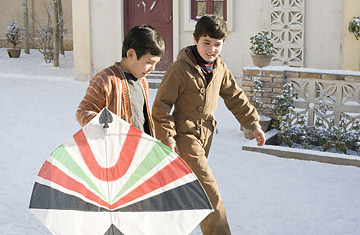
Zekeria Ebrahimi and Ahmad Khan Mahmidzada (left to right) star in Marc Forster's The Kite Runner.
The Kite Runner begins and ends in contemporary America, and the story it tells is firmly set against the history of modern Afghanistan, from a point just before the Soviet invasion of that unhappy land to the moment after the Taliban imposed its hateful fundamentalism on the country. Yet the movie version of Khaled Hosseini's best selling novel doesn't feel like it has been, as people used to say, "ripped from headlines." It instead has about it something of the air of a big, rich, very old-fashioned novel, telling the far-ranging story of two boys, one of them rich and well-favored, the other a servant in his household, growing to manhood in an increasingly violent world. The film is full of chaotic incident — one of the boys is gang-raped (an occasion for considerable overheated press comment a few months ago), the other, as an adult, witnesses an adulterous couple stoned to death. It also features a heartbreaking bretrayal, a disappearance into disparate refugee voids by both of them and the inspirational working out of one of those deep family secrets that were the great specialty of Charles Dickens and, for that matter, of American movies in their classic age, when they so often made first-rate entertainments of second-rate popular fiction.
But one does not feel like patronizing director Marc Forster's film. One feels more like cheering it along. Yes, it is full of contrivance and coincidence. Yes, it comes to an uplifting ending that is not entirely plausible. And yes, we somehow never doubt that the good people of this tale are somehow going to triumph, even when they lose everything and are immersed in historical darkness. That's because they have the only qualities that count in stories of this kind — pluck, decency and resilient spirits.
I think the film works as well as it does because Forster does not particularly force our feelings for his characters; bad things keep happening to them (loss of fortune and status, exile and illness, above all the way great historical events keep impinging on their little lives), but they keep gamely forging ahead, recouping their dreams. Or revising them. Or replacing them with new ones.
Forster is fortunate that Hosseinni has provided him with a lovely, appropriately cinematic novel and controlling metaphor, the kite flying that precedes his title's kite running. It seems that in the peaceable Kabul of yore, kids once flew kites competitively, hoping to cut their opponents' strings by deftly maneuvering their own kites as they swooped through the air. It is a pretty game, but one that also hints at the ferocities that will follow in this film. Once it is over, the kids ran madly through the streets to retrieve the beautiful object they had downed. The servant boy, Hassan (Ahmed Khan Mahmidzada), had no superior in this activity, and it is while pursuing a downed kite that he is raped by bullies, a crime Amir (played as a child by Zalenia Ebrahimi, as a grown-up by Khaled Abdalla) secretly witnesses without attempting to intervene. A terrible shame quickly follows for both boys and their relationship sunders. Amir and his father (stern yet yielding and well played by Homayoun Ershadi) escape to America, to avoid the Soviets, but never again see Hassan, who is lost in the fog of war. But he leaves a legacy, a son, who must be rescued from the Taliban by the mild-mannered Amir, who, in attempting to redeem this child, finally redeems himself from his boyhood cowardice.
I like the balance Forster and screenwriter David Benioff achieve between large historical events and purely personal ones, I like the easy, but never slack, pace of their storytelling, and, above all, I like the way sympathetic portraits do not shade into sentimental ones. This is a confident and honorable movie — and a gripping one. I've come to think that stories about ordinary people blown helplessly through the world on the winds of endless war were the central narrative of the 20th century and, likely, the central one of the 21st century as well. Much of humanity has been turned into kite fighters and kite runners in modern times as this film, complicated in its development but simple in its emotions, powerfully reminds us.
